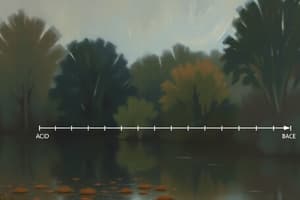Podcast
Questions and Answers
Acids have alkaline characteristics, while bases contain acetic acid.
Acids have alkaline characteristics, while bases contain acetic acid.
False (B)
Neutralization reactions involve the combination of an acid and a base to form water and a salt.
Neutralization reactions involve the combination of an acid and a base to form water and a salt.
True (A)
Table salt is composed of sodium cations (Na+) and hydrogen anions (H-) bonded together.
Table salt is composed of sodium cations (Na+) and hydrogen anions (H-) bonded together.
False (B)
A substance with a pH value of 5 is considered basic on the pH scale.
A substance with a pH value of 5 is considered basic on the pH scale.
There are only two types of salts known today: those formed between strong acids and weak bases, and between weak acids and strong bases.
There are only two types of salts known today: those formed between strong acids and weak bases, and between weak acids and strong bases.
When dissolved in water, an acid increases the concentration of OH⁻ ions.
When dissolved in water, an acid increases the concentration of OH⁻ ions.
Sodium bicarbonate is an example of a base due to its ability to produce hydroxide ions in water.
Sodium bicarbonate is an example of a base due to its ability to produce hydroxide ions in water.
Neutralization reactions always produce only water as a product.
Neutralization reactions always produce only water as a product.
The sour taste associated with acids is due to the increase in free protons in the solution.
The sour taste associated with acids is due to the increase in free protons in the solution.
The pH scale measures the concentration of hydroxide ions in a solution.
The pH scale measures the concentration of hydroxide ions in a solution.
Flashcards are hidden until you start studying
Study Notes
Acids, Bases, and Salts
In chemistry, understanding the concepts of acids, bases, and their reaction with each other is crucial. These fundamental principles can help us explain many processes in nature and even design new materials for various applications. Let's delve into these ideas more deeply.
Properties of Acids
An acid is a substance that increases the concentration of H+ ions when dissolved in water. This concept was first proposed by Svante Arrhenius who earned his Nobel Prize in Chemistry for this work. A common property of acids is their ability to react with metals like aluminum to produce hydrogen gas. In terms of everyday life, we often associate acids with sour taste because they increase the level of free protons in solution. Some well-known acids include sulfuric acid (H₂SO₄), nitric acid (HNO₃), and citric acid.
Properties of Bases
A base, or alkali, is a compound that produces OH⁻ ions (hydroxide) when dissolved in water. Like acids, there are also numerous household examples such as sodium bicarbonate (NaHCO₃), potassium oxalate (K₂C₂O₄), and lye (sodium hydroxide, NaOH). Bases generally have bitter tastes due to their high levels of hydroxide groups.
Neutralization Reactions
When an acid reacts with a base, it forms a salt and releases water. This process is called a neutralization reaction. An example could be adding baking soda (a base) to vinegar (an acid). Baking soda has alkaline characteristics while vinegar contains acetic acid, making them perfect partners for creating a fizzy eruption where carbon dioxide (CO₂) bubbles emerge from the mixture.
Types of Salts
Salt refers to any ionic compound that results from the combination of an acid and a base. For instance, table salt (common table salt) consists of sodium cations (Na+) and chloride anions (Cl-) bonded together through electrostatic attraction. There are several hundred different types of salts known today, including those formed between strong acids and weak bases, as well as between weak acids and strong bases.
pH Scale
The pH scale measures how much of an electron donor or acceptor a substance is, specifically its capacity to act as a Brønsted–Lowry acid or base. It ranges from 0 to 14, with values below 7 being considered acidic, values above 7 being basic, and a value of exactly 7 representing neutrality.
Understanding the unique traits of acids, bases, salts, and the pH scale allows chemists and laypeople alike to better comprehend chemical interactions and reactions in our daily lives. Whether it's maintaining proper health through balanced body fluids, cooking using leavening agents, or manufacturing innovative products, mastering the basics of acid-base chemistry provides a solid foundation for further exploration.
Studying That Suits You
Use AI to generate personalized quizzes and flashcards to suit your learning preferences.




